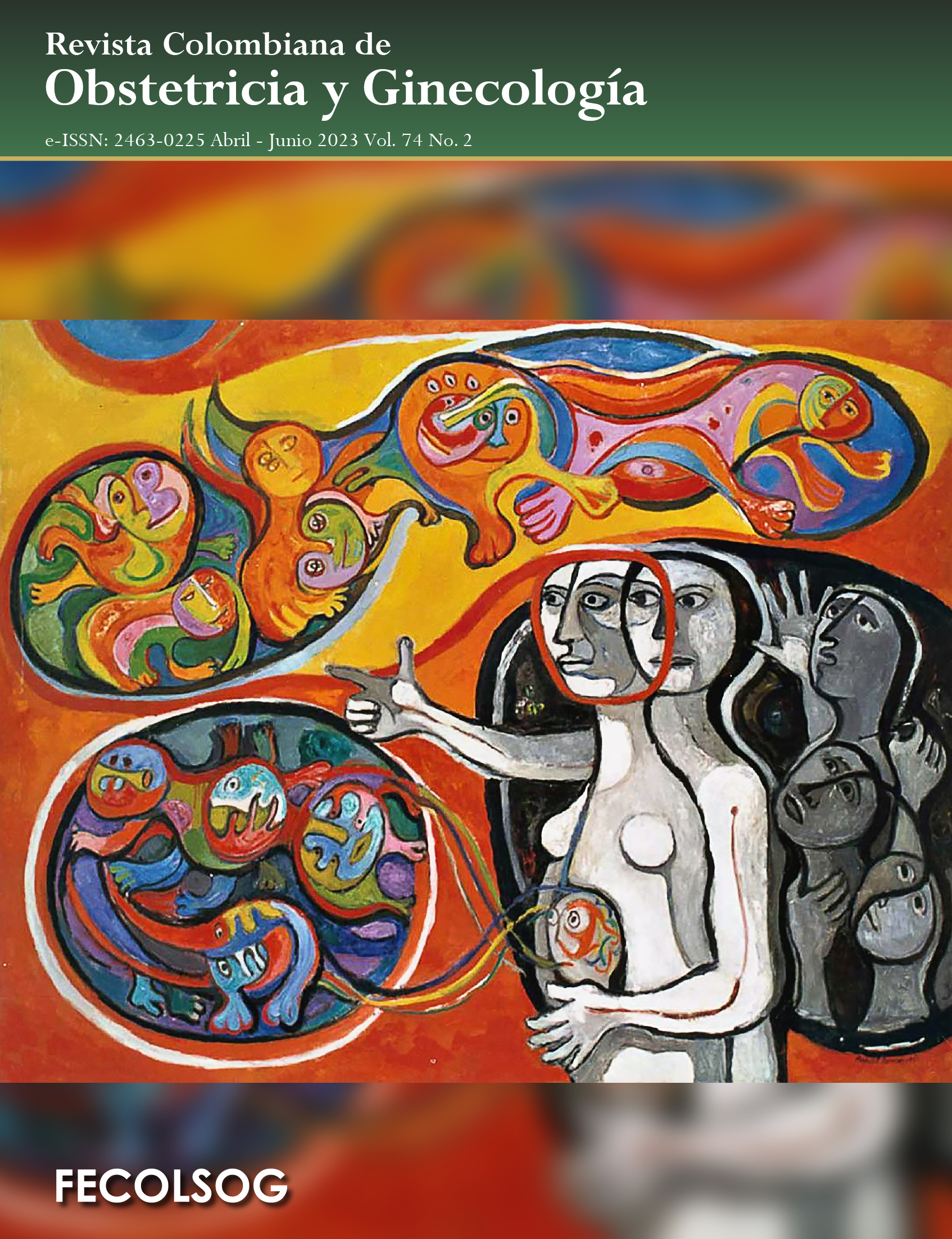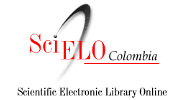Tumor response to neoadjuvant chemotherapy in molecular breast cancer subtypes in Medellin, Colombia. Retrospective cohort study
DOI:
https://doi.org/10.18597/rcog.3925Keywords:
Neoadjuvant therapy, breast neoplasm, retrospective studies, ColombiaAbstract
Objectives: To describe the frequency of clinical and pathological response in different molecular subtypes of breast cancer, in patients receiving prior neoadjuvant chemotherapy.
Materials and methods: Descriptive retrospective cohort. The study population consisted of women 18 years of age and older with a histological diagnosis of invasive breast cancer stages IIA, IIB, IIIA, IIIB and IIIC, with a classification by molecular subtypes, who had received prior neoadjuvant chemotherapy, seen at a high complexity clinic in Medellin (Colombia), between July 1, 2017, and July 30, 2019. We measured age clinical stage, histological characteristics, molecular classification, and complete clinical and pathological responses by molecular subtype. A descriptive analysis was conducted.
Results: Overall, 255 patients met the inclusion criteria. Mean age was 55.2 years; the clinical stages with the highest prevalence were IIIB (28.6 %) and IIB (26.3 %), and the most frequent by histologic grading were grades 3 (48.2 %) and 2 (37.3 %). Frequency by molecular types was as follows: luminal A (10.2 %), HER2-negative luminal B (39.6 %), triple-negative (23.1%), HER2-positive luminal B (13.7 %), and pure HER2 (13.3 %). Complete clinical response following chemotherapy, by molecular type, was as follows: luminal A (26.9 %), HER2-negative luminal B (37.6 %), HER2-positive luminal B (48.6 %), pure HER2 (41.2 %), triple-negative (45.8 %). Complete pathological response by molecular subtype was achieved in the luminal A (19.2 %), HER2-negative luminal B (32.7 %), HER2-positive luminal B (54.3 %), pure HER2 (50 %) and triple-negative (42.4 %) subtypes.
Conclusions: In clinical practice, breast cancer classification by molecular subtypes is a means to approach the assess the to neoadjuvant chemotherapy. Prospective studies are needed in the region in order to determine the ability to predict overall and disease-free survival based on the complete pathologic response.
Author Biographies
Manuela Restrepo-Mejía, Corporación Universitaria Remington, Medellín (Colombia).
Residente de Obstetricia y Ginecología, Corporación Universitaria Remington, Medellín (Colombia).
Ana Maria Guarín-García, Corporación Universitaria Remington, Medellín (Colombia).
Residente de Obstetricia y Ginecología, Corporación Universitaria Remington, Medellín (Colombia).
Óscar Alejandro Bonilla-Sepúlveda, Corporación Universitaria Remington, Medellín (Colombia).
Mastólogo, MSc en Epidemiología y Salud Pública; docente, Corporación Universitaria Remington, Medellín (Colombia).
Melissa Rincón-Medina, Corporación Universitaria Remington, Medellín (Colombia).
Estudiante programa de Medicina, Corporación Universitaria Remington, Medellín (Colombia).
Lina Marcela Barrera-Arenas, Corporación Universitaria Remington, Medellín (Colombia).
Docente grupo de Investigaciones Biomédicas, Corporación Universitaria Remington, Medellín (Colombia).
References
Global Cancer Statistics 2020: GLOBOCAN Estimates of Incidence and Mortality Worldwide for 36 Cancers in 185 Countries [Internet]. Disponible en: https://gco.iarc.fr/today/online-analysis-multi-bars?v=2020&mode=cancer&mode_population=countries&population=900&populations=900&key=total&sex=2&cancer=39&type=0&statistic=5&prevalence=0&population_group=0&ages_group%5B%5D=0&ages_group%5B%5D=14&nb_items=10&group_cancer=1&include_nmsc=0&include_nmsc_other=1&type_multiple=%257B%2522inc%2522%253Atrue%252C%2522mort%2522%253Atrue%252C%2522prev%2522%253Afalse%257D&orientation=horizontal&type_sort=0&type_nb_items=%257B%2522top%2522%253Atrue%252C%2522bottom%2522%253Afalse%257D
Sung H, Ferlay J, Siegel RL, Laversanne M, Soerjomataram I, Jemal A, et al. Global Cancer Statistics 2020: GLOBOCAN Estimates of Incidence and Mortality Worldwide for 36 Cancers in 185 Countries. CA Cancer J Clin. 2021;71(3):209-49. https://doi.org/10.3322/caac.21660
Correa AG, Sánchez LMB, Palacio NM. Situación del Cáncer, departamento de Antioquia. Año 2018;1-50 [Internet]. Disponible en: https://www.dssa.gov.co/images/estadisticas/cancer/ANTIOQUIA_PERFIL_DE_MORBILIDAD_POR_CANCER_2018.pdf
Quackenbush J. Microarray analysis and tumor classification. N Engl J Med. 2006;354(23):2463-72. https://doi.org/10.1056/NEJMra042342
Prat A., Ellis M., Perou C. Practical implications of gene-expression-based assays for breast oncologists. Nat Rev Clin Oncol. 2011;9(1):48-57. https://doi.org/10.1038/nrclinonc.2011.178
Blows FM, Driver KE, Schmidt MK, Broeks A, Van Leeuwen FE, Wesseling J, et al. Subtyping of breast cancer by immunohistochemistry to investigate a relationship between subtype and short and long term survival: A collaborative analysis of data for 10,159 cases from 12 studies. PLoS Med. 2010;7(5):e1000279. https://doi.org/10.1371/journal.pmed.1000279
Goldhirsch A, Winer EP, Coates AS, Gelber RD, Piccart-Gebhart M, Thürlimann B, et al. Personalizing the treatment of women with early breast cancer: Highlights of the St Gallen International Expert Consensus on the Primary Therapy of Early Breast Cancer 2013. Ann Oncol. 2013;24(9):2206-23. https://doi.org/10.1093/annonc/mdt303
National Comprehensive Cancer Network. NCCN Guidelines with Evidence Blocks - Breast Cancer (Version 3.2022). [Internet]. EE.UU.; 2022. Disponible en: https://www.nccn.org/guidelines/recently-published-guidelines
Ministerio de Salud y Protección Social. Guía de práctica clínica (GPC) para la detección temprana, tratamiento integral, seguimiento y rehabilitación del cáncer de mama. Versión completa [Internet]. 2013. Disponible en: https://www.minsalud.gov.co/sites/rid/1/Gu%C3%ADa%20de%20Pr%C3%A1ctica%20Cl%C3%ADnica%20%20de%20Cancer%20de%20Mama%20versi%C3%B3n%20completa.pdf
Singletary SE, Allred C, Ashley P, Bassett LW, Berry D, Bland KI, et al. Revision of the American Joint Committee on Cancer Staging System for Breast Cancer. J Clin Oncol. 2002;20(17):3628-36. https://doi.org/10.1200/JCO.2002.02.026
Cardoso F, Kyriakides S, Ohno S, Penault-Llorca F, Poortmans P, Rubio IT, et al. Early breast cancer: ESMO Clinical Practice Guidelines for diagnosis, treatment and follow-up. Ann Oncol. 2019;30(8):1194-220. https://doi.org/10.1093/annonc/mdz173
Giuliano AE, Ballman KV, McCall L, Beitsch PD, Brennan MB, Kelemen PR, et al. Effect of axillary dissection vs no axillary dissection on 10-year overall survival among women with invasive breast cancer and sentinel node metastasis: The ACOSOG Z0011 (Alliance) Randomized Clinical Trial. JAMA. 2017;318(10):918. https://doi.org/10.1001/jama.2017.11470
Veronesi P, Corso G. Standard and controversies in sentinel node in breast cancer patients. The Breast. 2019;48:S53-6. https://doi.org/10.1016/S0960-9776(19)31124-5
World Health Organization. WHO handbook for reporting results of cancer treatment [Internet]. Ginebra, Suiza; 1979. Disponible en: https://apps.who.int/iris/handle/10665/37200
Eisenhauer EA, Therasse P, Bogaerts J, Schwartz LH, Sargent D, Ford R, et al. New response evaluation criteria in solid tumours: Revised RECIST guideline (Version 1.1). Eur J Cancer. 2009;45(2):228-47. https://doi.org/10.1016/j.ejca.2008.10.026
Ogston KN, Miller ID, Payne S, Hutcheon AW, Sarkar TK, Smith I, et al. A new histological grading system to assess response of breast cancers to primary chemotherapy: Prognostic significance and survival. The Breast. 2003;12(5):320-7. https://doi.org/10.1016/S0960-9776(03)00106-1
Tresserra F, Martínez MÁ, González-Cao M, Rodríguez I, Viteri S, Baulies S, et al. Respuesta patológica a la quimioterapia neoadyuvante: correlación entre 2 sistemas de gradación histológica. Rev Senol Patol Mamar. 2013;26(3):77-84. https://doi.org/10.1016/j.senol.2013.01.004
Cortazar P, Zhang L, Untch M, Mehta K, Costantino JP, Wolmark N, et al. Pathological complete response and long-term clinical benefit in breast cancer: The CTNeoBC pooled analysis. The Lancet. 2014;384(9938):164-72. https://doi.org/10.1016/S0140-6736(13)62422-8
Fayanju OM, Ren Y, Thomas SM, Greenup RA, Plichta JK, Rosenberger LH, et al. The clinical significance of breast-only and node-only pathologic complete response (pCR) after neoadjuvant chemotherapy (NACT): A review of 20,000 breast cancer patients in the National Cancer Data Base (NCDB). Ann Surg. 2018;268(4):591-601. https://doi.org/10.1097/SLA.0000000000002953
Díaz-Casas SE, Castilla-Tarra JA, Pena-Torres E, Orozco-Ospino M, Mendoza-Diaz S, Nuñez-Lemus M, et al. Pathological response to neoadjuvant chemotherapy and the molecular classification of locally advanced breast cancer in a Latin American Cohort. The Oncologist. 2019;24(12):e1360-70. https://doi.org/10.1634/theoncologist.2019-0300
González MF, Rojas S. Incidencia de respuesta patológica completa en pacientes con cáncer de seno tratadas con quimioterapia neoadyuvante en Bogotá [Internet]. Universidad del Rosario. https://doi.org/10.48713/10336_30978
Haque W, Verma V, Hatch S, Suzanne Klimberg V, Brian Butler E, Teh BS. Response rates and pathologic complete response by breast cancer molecular subtype following neoadjuvant chemotherapy. Breast Cancer Res Treat. 2018;170(3):559-67. https://doi.org/10.1007/s10549-018-4801-3
Lakshmanan S, Mehrdad G, Hadi T, Ali S, Sonal G, Frances C, et al. Response monitoring of breast cancer patients receiving neoadyvant chemotherapy using quantitative ultrasound, texture, and molecular features. Plos One. 2018;13(1);1-18. https://doi.org/10.1371/journal.pone.0189634
Kunnuru SKR, Thiyagarajan M, Martin Daniel J, Singh K B. A Study on clinical and pathological responses to neoadjuvant chemotherapy in breast carcinoma. Breast Cancer Targets Ther. 2020;12:259-66. https://doi.org/10.2147/BCTT.S277588
Bonnefoi H, Litière S, Piccart M, MacGrogan G, Fumoleau P, Brain E, et al. Pathological complete response after neoadjuvant chemotherapy is an independent predictive factor irrespective of simplified breast cancer intrinsic subtypes: A landmark and two-step approach analyses from the EORTC 10994/BIG 1-00 phase III trial. Ann Oncol. 2014;25(6):1128-36. https://doi.org/10.1093/annonc/mdu118
How to Cite
Downloads
Downloads
Published
Issue
Section
License

This work is licensed under a Creative Commons Attribution-NonCommercial-NoDerivatives 4.0 International License.
| Article metrics | |
|---|---|
| Abstract views | |
| Galley vies | |
| PDF Views | |
| HTML views | |
| Other views | |
















